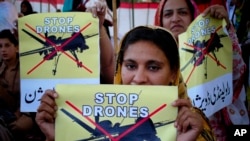ISLAMABAD —
Pakistan’s government has come under severe criticism within and outside the country for providing conflicting estimates of the number of civilians killed in American drone strikes.
The Ministry of Defense told the Senate that drones have killed just over 2,200 people in the past five years, including 67 civilians. The rest, it said, were suspected terrorists, adding the claim that last year, the U.S. missile strikes did not kill any civilians.
Conflicting numbers
The latest official figures are far below estimates of civilian deaths in drone strikes Pakistani officials have provided to international rights groups, including the United Nations panel investigating the attacks.
Shahzad Akbar, a Pakistani lawyer for civilian victims of drone strikes, said the federal government earlier this year put the civilian death toll since 2008 at around 1,400. He said the sharp downward revision is likely to undermine Pakistan’s efforts to seek an end to American drone operations on its territory.
“I think it is going to impact the government’s own credibility and accountability that how they have come up with this figure and they even submitted it in parliament whereas in court of law they have submitted a completely different figure," Akbar said. "So either they are lying to the parliament or lying to the court.”
A U.N. panel investigating the American drone strikes recently quoted Pakistan's Foreign Ministry as telling panel chief Ben Emmerson that at least 400 civilians had died in drone strikes since 2004.
Amnesty International said that last year alone it was able to confirm 19 civilian deaths in drone attacks, which have mostly targeted areas in the North Waziristan tribal district.
Demand for explanation
United Nations Special Rapporteur Emmerson has called on the Pakistani government to explain discrepancies in its civilian casualty figures.
Foreign Ministry spokesman Aizaz Ahmad Chaudhry said the Pakistani government considers drones as being counterproductive for its anti-militancy efforts and that they are causing collateral damage.
“The government has already evolved a national consensus on this matter and pursuing a strategy of taking up this matter bilaterally with the United States as well as raising it at the international fora,” Chaudhry said.
But the spokesman did not explain the discrepancy in official casualty figures.
“There are different assessments about the numbers. We are in touch with the ministry of defense to get full details on this matter,” he told reporters.
US-Pakistan cooperation
While American officials do not publicly discuss the drone operations, they say in general that the missile strikes are carefully planned to minimize collateral damage and the deaths of civilians. U.S. intelligence officials have long hinted at Pakistani cooperation.
Opposition lawmakers like Shireen Mazari are demanding the government come clean on its policy regarding the U.S. drones.
“They can't continue the lie that the previous government did," Mazari said. "People are not going to tolerate this duplicity anymore.”
Amnesty International says that the discrepancy in Pakistani death figures is an indicator of the secrecy over the U.S. drones program and that the U.S. government should should be more forthcoming about the specifics of the strikes.
The Ministry of Defense told the Senate that drones have killed just over 2,200 people in the past five years, including 67 civilians. The rest, it said, were suspected terrorists, adding the claim that last year, the U.S. missile strikes did not kill any civilians.
Conflicting numbers
The latest official figures are far below estimates of civilian deaths in drone strikes Pakistani officials have provided to international rights groups, including the United Nations panel investigating the attacks.
Shahzad Akbar, a Pakistani lawyer for civilian victims of drone strikes, said the federal government earlier this year put the civilian death toll since 2008 at around 1,400. He said the sharp downward revision is likely to undermine Pakistan’s efforts to seek an end to American drone operations on its territory.
“I think it is going to impact the government’s own credibility and accountability that how they have come up with this figure and they even submitted it in parliament whereas in court of law they have submitted a completely different figure," Akbar said. "So either they are lying to the parliament or lying to the court.”
A U.N. panel investigating the American drone strikes recently quoted Pakistan's Foreign Ministry as telling panel chief Ben Emmerson that at least 400 civilians had died in drone strikes since 2004.
Amnesty International said that last year alone it was able to confirm 19 civilian deaths in drone attacks, which have mostly targeted areas in the North Waziristan tribal district.
Demand for explanation
United Nations Special Rapporteur Emmerson has called on the Pakistani government to explain discrepancies in its civilian casualty figures.
Foreign Ministry spokesman Aizaz Ahmad Chaudhry said the Pakistani government considers drones as being counterproductive for its anti-militancy efforts and that they are causing collateral damage.
“The government has already evolved a national consensus on this matter and pursuing a strategy of taking up this matter bilaterally with the United States as well as raising it at the international fora,” Chaudhry said.
But the spokesman did not explain the discrepancy in official casualty figures.
“There are different assessments about the numbers. We are in touch with the ministry of defense to get full details on this matter,” he told reporters.
US-Pakistan cooperation
While American officials do not publicly discuss the drone operations, they say in general that the missile strikes are carefully planned to minimize collateral damage and the deaths of civilians. U.S. intelligence officials have long hinted at Pakistani cooperation.
Opposition lawmakers like Shireen Mazari are demanding the government come clean on its policy regarding the U.S. drones.
“They can't continue the lie that the previous government did," Mazari said. "People are not going to tolerate this duplicity anymore.”
Amnesty International says that the discrepancy in Pakistani death figures is an indicator of the secrecy over the U.S. drones program and that the U.S. government should should be more forthcoming about the specifics of the strikes.











